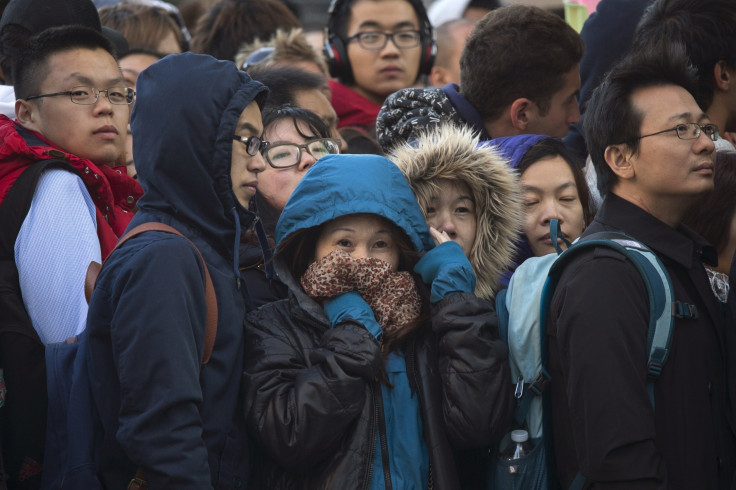Apple iPhone 6 Reselling: Inside The Chinese Grey Market For iPhones

Tuesday afternoon on Manhattan’s famed Fifth Avenue, a modestly dressed middle-aged Chinese woman sat on a small folding stool she pulled from her backpack and settled in at the back of a line that snaked across the plaza outside Apple’s flagship store in New York. Accompanied by her husband, caring for a toddler, and an elderly woman, she was there to purchase the new iPhone 6, which she would get after a five-hour wait. (She'd been there five hours already.)
It wasn't her first iPhone 6, either. She was already the owner of six of Apple’s coveted new smartphones. She and the two other adults that accompanied her each got two and paid in cash, not with a credit card, allowing them to return to the back of the line to buy more, defying Apple’s two-phone cap per customer.
The woman in line, who asked not to be named, was one of several groups of Chinese immigrants queuing up at the Apple Store to buy iPhones to resell on the black market. Originally hailing from Southeast China but now living in New York City, she said that she got in the queue at 8 a.m. and didn’t get the phones until 1. By 1:30 p.m., she was back in line.
Apple employees working the queue had already announced that all iPhone 6 Plus and the 16GB iPhone 6 were already sold out. “I have the gold iPhone 6 in 16 GB, and I’ll give it to you for $774,” she said in Chinese, with a Southeast accent. For roughly a $70 markup, or what she called her “labor fee,” she was offering to save a reporter five hours waiting in line by selling her one of the six phones she had purchased just minutes prior, essentially operating a small-scale black market right under Apple’s nose. All her transactions are cash-only, and she said she accepted Chinese yuan, too, at her own, skewed exchange rate of 6 RMB to the U.S. dollar.
This was apparently common. A similarly Southeast Chinese-accented man approached me prior to even getting in line. “Are you going to buy an iPhone 6?” he asked. The man said he had just purchased two gold iPhone 6 smartphones and two gold iPhone 6 Plus phones, and more were about to come: He had a friend downstairs coming up with two more.
While the two groups of iPhone resellers were unrelated, many Chinese are capitalizing on the hype surrounding Apple’s newest smartphone and China’s red-tape delays, by creating an off-the-books business opportunity.
The craze surrounding Apple’s newest smartphone launch has been marked with astonishingly long waits and record-breaking sales in the U.S., but also around the world. A week later, the demand for Apple’s latest product has not subsided, in large part due to China’s market. The hype has only been stoked after Chinese consumers realized they wouldn't be part of the international launch, fueling a black market to resell the coveted iPhone at a markup. As China’s government takes its time to put the 6 on the Ministry of Industry and Information Technology’s list of devices approved for sale in China, Apple has remained mum on when a China launch could be expected.
But if Chinese buyers can't get the iPhone 6, those in New York's Chinatown certainly can.
The woman in line said she planned to resell the iPhone 6s at the various electronic shops that dot Chinatown’s Canal Street and usually sell to Chinese customers -- who then would bring the phones back to China, which is where they were assembled in the first place.
She said that on Monday she sold five phones to a customer who had plans to resell them back in China, adding that she had heard of phones being sold for as much as 10,000 yuan, or roughly $1,629. In stores around Beijing, the iPhone 6 in gold -- a color coveted in China -- is selling for more than $4,000. Though aware there was much more money to make if she sold directly overseas, the woman said she preferred to get the phones off her hands as soon as possible, even if it meant taking a significantly smaller profit.
By the time the phones get to these Chinatown electronic shops, the markup triples. The same 16 GB iPhone 6 in gold model that could have been bought for $774 from the woman in the Apple Store line was priced at $900 in one of Chinatown’s handful of electronics shops.
Chinese resellers in New York were mostly small operations, with groups of three or four people coming together to maximize the number of phones bought per visit to the Apple store. While the Chinese people doing the waiting were not making as much money as the resellers in Chinatown or China, they could still get more than $800 for a day’s work -- much, much more than what they would make at the menial jobs typically held by recent immigrants from China.
© Copyright IBTimes 2025. All rights reserved.




















